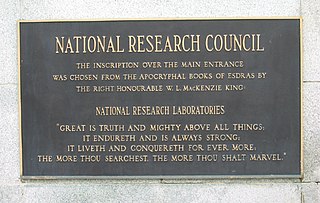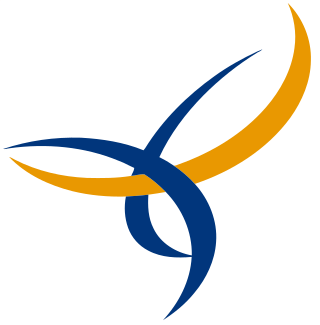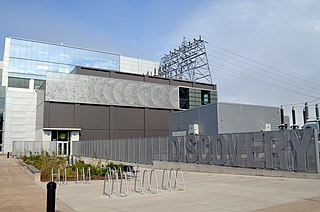
The University of Calgary is a public research university located in Calgary, Alberta, Canada. The University of Calgary started in 1944 as the Calgary branch of the University of Alberta, founded in 1908, prior to being instituted into a separate, autonomous university in 1966. It is composed of 14 faculties and over 85 research institutes and centres. The main campus is located in the northwest quadrant of the city near the Bow River and a smaller south campus is located in the city centre. The main campus houses most of the research facilities and works with provincial and federal research and regulatory agencies, several of which are housed next to the campus such as the Geological Survey of Canada. The main campus covers approximately 200 hectares.

The University of Saskatchewan is a Canadian public research university, founded on March 19, 1907, and located on the east side of the South Saskatchewan River in Saskatoon, Saskatchewan, Canada. An "Act to establish and incorporate a University for the Province of Saskatchewan" was passed by the provincial legislature in 1907. It established the provincial university on March 19, 1907 "for the purpose of providing facilities for higher education in all its branches and enabling all persons without regard to race, creed or religion to take the fullest advantage". The University of Saskatchewan is the largest education institution in the Canadian province of Saskatchewan. The University of Saskatchewan is one of Canada's top research universities and is a member of the U15 Group of Canadian Research Universities.

The National Research Council Canada is the primary national agency of the Government of Canada dedicated to science and technology research and development. It is the largest federal research and development organization in Canada.

Ontario Tech University (OTU), also known as Ontario Tech, is a public research university located in Oshawa, Ontario, Canada. The university's main campus is located on approximately 160 hectares of land in northern Oshawa, while its secondary satellite campus is situated in downtown Oshawa. The university is a co-educational institution that operates seven academic faculties.

Perimeter Institute for Theoretical Physics is an independent research centre in foundational theoretical physics located in Waterloo, Ontario, Canada. It was founded in 1999. The institute's founding and major benefactor is Canadian entrepreneur and philanthropist Mike Lazaridis.

The Hospital for Sick Children (HSC), corporately branded as SickKids, is a major pediatric teaching hospital located on University Avenue in Toronto, Ontario, Canada. Affiliated with the Faculty of Medicine of the University of Toronto, the hospital was ranked the top pediatric hospital in the world by Newsweek in 2021.

The Natural Sciences and Engineering Research Council of Canada is the major federal agency responsible for funding natural sciences and engineering research in Canada. NSERC directly funds university professors and students as well as Canadian companies to perform research and training. With funding from the Government of Canada, NSERC supports the research of over 41,000 students, trainees and professors at universities and colleges in Canada with an annual budget of CA$1.1 billion in 2015. Its current director is Alejandro Adem.

Science North is an interactive science museum in Greater Sudbury, Ontario, Canada.

Science World is a science centre run by a not-for-profit organization called ASTC Science World Society in Vancouver, British Columbia, Canada. It is located at the end of False Creek and features many permanent interactive exhibits and displays, as well as areas with varying topics throughout the years.

The Canadian Institutes of Health Research is a federal agency responsible for funding health and medical research in Canada. Comprising 13 institutes, it is the successor to the Medical Research Council of Canada.
The Doctor of Engineering is a professional doctorate in engineering and applied science. An EngD is a terminal degree similar to a PhD in engineering but applicable more in industry rather than in academia. The degree is usually aimed toward working professionals.
Science outreach, also called education and public outreach or simply public outreach, is an umbrella term for a variety of activities by research institutes, universities, and institutions such as science museums, aimed at promoting public awareness of science and making informal contributions to science education.

The National Core for Neuroethics at the University of British Columbia was established in August 2007, with support from the Canadian Institutes of Health Research, the Institute of Mental Health and Addiction, the Canada Foundation for Innovation, the British Columbia Knowledge Development Fund, the Canada Research Chairs program, the UBC Brain Research Centre and the UBC Institute of Mental Health. Co-founded by Judy Illes and Peter Reiner, the Core studies neuroethics, with particular focus on ethics in neurodegenerative disease and regenerative medicine, international and cross-cultural challenges in brain research, neuroimaging and ethics, the neuroethics of enhancement, and personalized medicine.

Discovery Centre is an interactive science museum in Halifax, Nova Scotia. It is a not-for-profit charitable organization whose mission is to stimulate interest, enjoyment and understanding of science and technology.

The College of Engineering and Physical Sciences (CEPS), is one of seven faculties – referred to as “colleges” – at the University of Guelph in Ontario, Canada. CEPS operates on the University of Guelph main campus, one of four across Ontario, and has one of the largest faculty, staff, and student populations of the seven colleges at U of G.

Michael R. Hayden, is a Killam Professor of Medical Genetics at the University of British Columbia, the highest honour UBC can confer on any faculty member. Only four such awards have ever been conferred in the Faculty of Medicine. Dr. Hayden is also Canada Research Chair in Human Genetics and Molecular Medicine. Hayden is best known for his research in Huntington disease (HD).
The Association of Canadian Archivists (ACA), established in 1975, is a national not-for-profit organization representing over 600 archivists in Canada. With headquarters in Ottawa, the ACA's mandate is to provide leadership to the archival profession and to increase an understanding and appreciation of Canada's archival heritage.

The Canadian Public Health Association (CPHA) is a national non-profit organization dedicated to public health.
B. Brett Finlay, is a Canadian microbiologist well known for his contributions to understanding how microbes cause disease in people and developing new tools for fighting infections, as well as the role the microbiota plays in human health and disease. Science.ca describes him as one of the world's foremost experts on the molecular understanding of the ways bacteria infect their hosts. He also led the SARS Accelerated Vaccine Initiative (SAVI) and developed vaccines to SARS and a bovine vaccine to E. coli O157:H7. His current research interests focus on pathogenic E. coli and Salmonella pathogenicity, and the role of the microbiota in infections, asthma, and malnutrition. He is currently the UBC Peter Wall Distinguished Professor and a Professor in the Michael Smith Laboratories, Microbiology and Immunology, and Biochemistry and Molecular Biology, and Co-director and Senior Fellow for the CIFAR Humans and Microbes program. He is also co-author of the book Let Them Eat Dirt: Saving Your Child from an Oversanitized World and The Whole-Body Microbiome: How to Harness Microbes - Inside and Out - For Lifelong Health. Finlay is the author of over 500 publications in peer-reviewed journals and served as editor of several professional publications for many years.

Acuitas Therapeutics Inc. is a Canadian biotechnology company based in Vancouver, British Columbia. The company was established in February 2009 to specialize in the development of delivery systems for nucleic acid therapeutics based on lipid nanoparticle (LNP) technology, a key component of the mRNA vaccines deployed for COVID-19.















